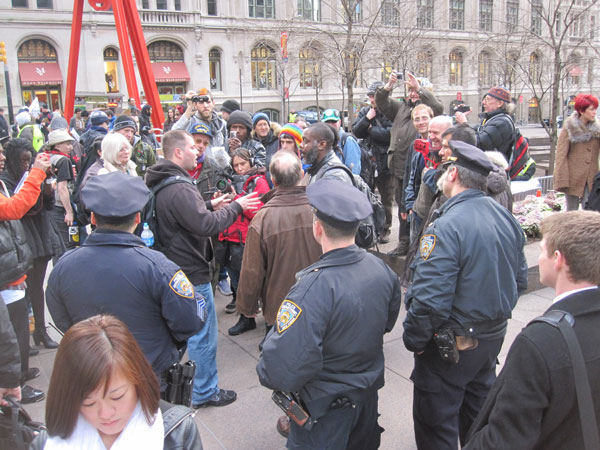 [/media-credit]
[/media-credit]
- On Tuesday, following the arrest of an Occupy Wall Street activist, Zuccotti Park was again in the NYPD’s crosshairs.
BY ZACH WILLIAMS | While the difficulties of winter have taken their toll, Occupy Wall Street organizers say they are confident that an ‘American Spring’ is in the making.
Occupy events in recent days have not drawn the same volume of participants as months ago. The movement continues to remain active in the area though, including Tuesday when at least one activist was arrested at Zuccotti Park.
A recent spending freeze has curtailed many of the movement’s activities. However, recent events in Lower Manhattan underscore an increasing collaboration between ‘occupiers’ and progressive organizations that, organizers say, will keep the movement moving.
“The Occupy Wall Street movement re-ignited, revitalized, rekindled the spirit of struggle, the spirit of movement building among all peoples,” said Dr. Benjamin Chavis, an organizer for Occupy the Dream and an associate of Dr. Martin Luther King Jr. in the 1960s.
“An American spring, it’s coming,” he added. “You are going to see mass mobilizations, but they are going to be orderly. They are going to be organized. They are going to be disciplined … it’s our responsibility to out-maneuver, out-smart, out-organize the enemies of the movement.”
Ongoing meetings between civil rights leaders and Occupy Wall Street activists are focusing on how to stage joint actions in the coming months, according to Chavis who declined to provide specific details.
Many ‘occupiers’ say the movement will remain in “hibernation” in Lower Manhattan until warmer weather prevails in the upcoming months. Protests, marches and other actions continue to mobilize supporters, though in smaller numbers than in prior months. Symbolic victories though continue to give Occupy Wall Street attention from the media.
A week before the Jan. 17 four month anniversary of the movement, Brookfield Properties dismantled the metal barriers which had encircled Zuccotti Park since a Nov. 15 NYPD raid ended the encampment there. Private security still remains in Zuccotti with the barriers now stored in a corner of the park.
The move followed the release of a Jan. 9 letter from the New York Civil Liberties Union to Commissioner Robert LiMandri of the city Department of Buildings. The letter stated that the barriers violated first amendment protections, city zoning ordinances and a 1968 agreement which required Brookfield Properties to allow public access to the park.
A spokesperson for Brookfield Properties declined to comment on the letter’s effect on the company policy concerning the park.
Though many activists said no new efforts at occupying public spaces in the area are currently underway, a few holdouts continue to maintain a presence at the park. Activists interviewed there said it was important to have information available for tourists who visit the once obscure park in addition to maintaining visibility at what had become the symbolic center of the movement.
Ned Merrill, a resident of the Upper West Side who joined the movement in September, said that the ongoing deployment of private security in the park underscores the need to maintain a presence there, regardless of size.
“All we need here is a symbolic presence, you know, five, ten people is fine,” Merrill added.
Members of the New York City General Assembly, which ostensibly governs Occupy Wall Street, reached consensus on Jan. 14 to freeze most spending among its working groups. Medical and food services received exemptions along with the housing working group, which will be allowed to submit one more funding proposal to provide housing for activists who are currently homeless, according to Christine Crowther, a member of the accounting working group.
Before the freeze, working groups had been allowed to incur up to $100 in expenses per day without needing to secure approval from the General Assembly. Occupy Wall Street currently has about $340,000 in the bank of which about $100,000 is reserved for legal expenses, said Haywood Carey, a member of the accounting working group.
A discussion of the spending freeze Monday night centered on whether it applied to the Spokes Council as well. At the meeting members of the facilitation and archives working groups said that the freeze was inhibiting their respective efforts to set up meeting venues for the council and properly record events within the movement.
Whether the council can approve additional funding for the groups has yet to be decided. The issue cannot be resolved until the exact wording of the spending freeze is determined by consulting meeting records, which as of Monday were not available, according to sources.
Despite the financial and organizational challenges facing the movement, many ‘occupiers’ said they remain patiently confident their movement will maintain its vigor through the winter.
Tony Zilka, a singer from Portland, Oregon, came to NYC recently on his way to “Occupy Congress” last week. He said recent media coverage suggests the movement has lost vitality, though he feels that events in Lower Manhattan indicate Occupy Wall Street remains active.
“Coming out and seeing all of these amazing civil rights leaders, all of these amazing mega-organizers are still here and still want to help us,” he said at a holiday event celebrating Dr. Martin Luther King Jr. “They want to see this movement grow so badly.”


































